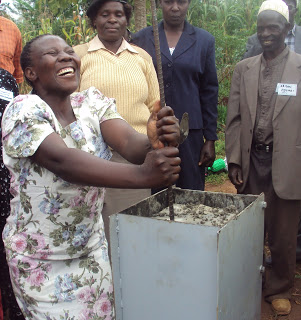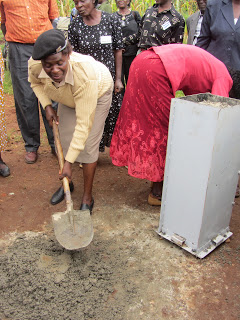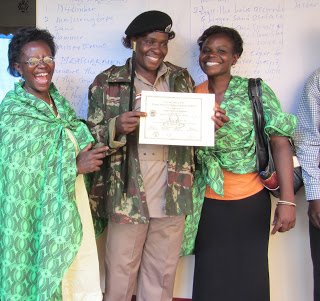GWWI Women and Water: GWWI Graduate Wins Top Prize from Ministry of Water and Irrigation
Congratulations to GWWI Graduates Lindah Wameya and Jane Wanjiko Joseph of Kilili Self-Help Program (KSHP) who won the Top Prize in the “Water For CIties” Ministry of Water and Irrigation National Competition! Lindah and Jane won for their essay promoting what they learned at Global Women’s Water Initiative Training in Uganda last summer – Water, Sanitation and Hygiene Education (WASH) and the Biosand Filter as a viable solution for safe drinking water. Here is an excerpt from their award-winning work:

KSHP community member learns to build the Biosand Filter
KSHP’s vision and mission statement is to be a center of excellence promoting eco-health for economic development by safeguarding and enhancing eco-health for improved livelihoods through research and extension services to enhance adoption of technologies by local communities for food security and ecosystem health.
KSHP operates in a cosmopolitan community whose main activity is farming. The people in this community draw their waters from wells, protected springs, borehole rivers, hand pumps and tanks especially during rainy seasons. KSHP conducts trainings at grassroots levels on water, sanitation and hygiene with an emphasis household water treatment using biosand water filters.
The economic growth and scale of urbanization in Trans-Nzoia District has a high environmental cost. Urban environment services are inadequate and pollution levels are high. Cities and towns suffer from high rates of air, water and land pollution, creating a serious threat to public health. Inadequate portable water suppliers, inadequate solid waste management and wastewater collection are a cute problem. KSHP improves drinking water, and water used for other domestic purposes through household water treatment technology (Biosand water filter)

District Chief lends her hand to build Biosand Filters
The Biosand water filter is a modified form of traditional slow sand filter in such a way that filters can be built on a smaller scale group and operated intermittently. These modifications make the Biosand water filter suitable for household or small groups. The Biosand filter is produced locally anywhere in the world using materials that are readily available. The Biosand filter is used as part of multi-barrier approach which is the best way to reduce the health risk of drinking unsafe water. Barriers from pathogen occur in each of the steps; protection of the source of water, sedimentation, filtration and finally safe storage after filtration.

District Chief receives her Certificate of Completion as a
Biosand Filter Implementer and WASH Educator
The community has already adopted and coped with the biosand technology since it was incepted, it is one cheap, appropriate, accessible and easily managed method of household water treatment. There are also reduced incidences of waterborne diseases among the vulnerable persons. Income generation among women and the youth has increased with the implementation of Biosand filters. Immediately after the community was trained on construction and installation of the Biosand water filter the demand for filter is high, this illustrates that filters are widely accepted regardless of religion, race, age and status.The community has already adopted and coped with the biosand technology since it was
